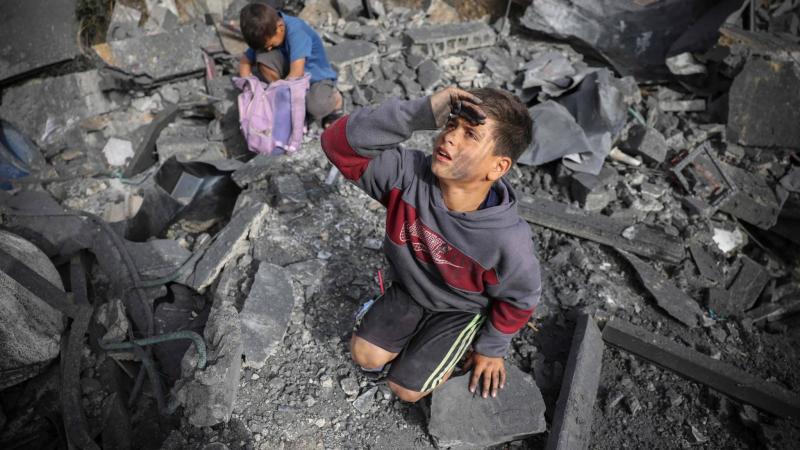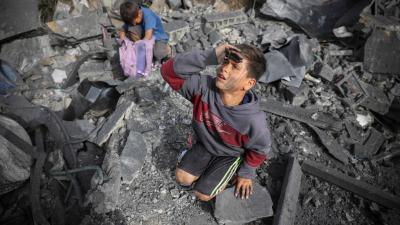International mediators hope to resume stalled ceasefire negotiations between Israel and Hamas through a new round aimed at ultimately reaching an agreement between the two sides. However, hopes for a breakthrough do not seem bright. A new round of negotiations is expected to begin on Thursday, but Israel and Hamas have been considering an internationally backed proposal for over two months that would end the 10-month-long war and secure the release of around 110 prisoners still held in Gaza. The indirect negotiations have not made substantial progress during that period, with persistent sticking points, and new conditions proposed have complicated the prospects for advancement. Hamas has not yet announced whether it will participate in the new round.
On the other hand, fighting continues in Gaza, hostages remain captive, and fears of an outbreak of a comprehensive regional war between Israel on one side and Iran and Hezbollah on the other persist. The killing of Hamas political bureau chief Ismail Haniyeh in Tehran—likely due to an Israeli attack—has exacerbated uncertainty regarding the negotiations. Below is an overview of the proposed ceasefire agreement and the reasons behind the stalled talks.
#### What Is the Proposal?
On May 31, U.S. President Joe Biden provided details of what he described as an Israeli proposal for a ceasefire, which he called a "roadmap" for a permanent truce and the release of prisoners. Following this, U.S. efforts intensified to end the war. The proposal consists of three phases:
- The first phase lasts six weeks and includes a complete ceasefire, withdrawal of Israeli forces from all densely populated areas in Gaza, and the release of several prisoners, particularly women, the elderly, and the injured, in exchange for the release of hundreds of Palestinian prisoners. It also enables Palestinian civilians to return to their homes and facilitates increased entry of humanitarian aid.
- Both sides will use the six-week period to negotiate the second phase, which Biden stated includes the release of all remaining living prisoners, including male soldiers, full withdrawal of Israel from Gaza, and a transition of the ceasefire from temporary to permanent.
- The third phase involves a substantial reconstruction process for Gaza, which requires decades of rebuilding after the destruction caused by the war.
#### What Are the Sticking Points?
Despite Biden's backing of the proposal, it has not led to a breakthrough, and the two sides have seemingly become more distant since then. Israel has expressed concerns over a provision in the plan that would extend the initial ceasefire throughout the second phase of negotiations. Israel appears worried that Hamas may engage in endless non-productive negotiations.
On its part, Hamas seems concerned about Israel resuming the war immediately after recovering some of its hostages, as recently indicated by statements from Israeli Prime Minister Benjamin Netanyahu. Israel may also advance demands during this phase of negotiations that were not part of the initial agreement, which Hamas would find unacceptable, thereby resuming the war upon Hamas's rejection.
Recently, Israel added further demands to the initial proposal, according to officials familiar with the negotiations. In a statement issued Tuesday, Netanyahu's office denied this, describing the additional conditions as "essential clarifications." Israel stated that Hamas had added 29 stipulations and conditions without specifying any of them. Egyptian officials reported that Israel is seeking to maintain control over the Salah al-Din axis (Philadelphi route), which it believes Hamas uses to smuggle weapons via underground tunnels—a claim Egypt denies.
Israel also demands to maintain a presence of its forces along the north-south route that divides Gaza, allowing for the elimination of any "militants" crossing into northern Gaza. Netanyahu's office claimed Israel desires a means to ensure this but denied that it constituted an additional condition. Hamas rejected this demand, asserting that Israel would use it as a pretext to prevent Palestinians from returning home.
Officials familiar with the negotiations and Netanyahu’s office indicated that Israel also seeks the right to refuse the release of certain Palestinian prisoners, with Hamas rejecting any concessions on this matter. Among Israel's demands is a list of names of surviving prisoners, which Hamas has rejected, according to officials who requested anonymity due to the sensitivity of the negotiations.
#### What Other Factors Are Hindering Progress?
Negotiations faced further obstacles last month when an explosion killed Hamas leader Ismail Haniyeh while he was in Tehran for the inauguration of the Iranian president. The attack was widely blamed on Israel, which neither confirmed nor denied responsibility. Biden stated that the assassination "did not help" ceasefire efforts, and negotiations fell into a stalemate.
The assassination occurred just hours after a prominent Hezbollah commander was killed in an airstrike in Beirut. Both operations prompted warnings from Iran and Hezbollah of retaliation, raising fears of a comprehensive regional war and shifting international attention away from ceasefire efforts in Gaza. The assassinations sparked a flurry of diplomatic activity and prompted Washington to deploy military assets to the region.
Both Netanyahu and new Hamas leader Yahya Sinwar have motivations to continue the war. Critics of Netanyahu argue that he wishes to prolong the conflict for his political survival. His far-right coalition partners have threatened to topple the government if he agrees to a ceasefire, which could lead to elections that might oust him from power. Netanyahu has denied this, stating that he only considers the country’s interests. Meanwhile, Hamas has benefited from international condemnation of Israel due to the war, and Haniyeh's death suggests that Sinwar's life is at risk if he emerges after the war concludes.




